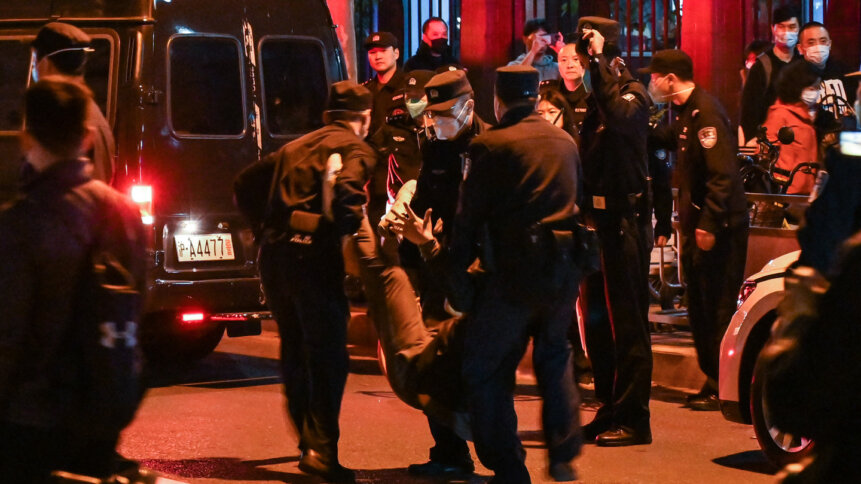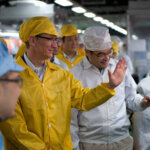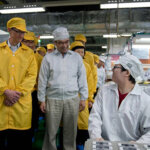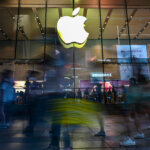iPhone factory Covid protests spread throughout China

If you’ve ever doubted the potential importance of the technology sector to the politics of nations, events in China should cure you of your skepticism. Protests against the country’s strict zero-Covid policy first erupted at the Foxconn factory in Zhengzhou, home of the largest iPhone manufacturing center in the world. Those protests are now spreading to some of China’s biggest cities, including Beijing, the country’s capital, and Shanghai, home of its financial hub.
Some protestors have even called for President Xi Jinping to step down.
An unprecedented action
That’s an action positively unprecedented in modern Communist China, where vocal dissent from the government’s line can frequently – even routinely – result in significant penalties.
It is of course true to say that the protests come after three solid years of zero-Covid policies making life all across China increasingly hard, with mass testing, quarantine procedures, and sudden, as-judged-necessary lockdowns interrupting the flow of life, work, family and society in general across what remains the world’s most densely populated country.
Anyone in the West need only cast their minds back to the (first) Trump presidency – everybody in those days felt like they were living under the Trump presidency, thanks to the news media’s obsession with the world’s most powerful man and the existence of Twitter as a bully pulpit – to remember what life in a country trying to handle a global pandemic was like. Masks, social distancing, the danger of communal living, as in residential homes for seniors, and the lockdowns that transformed our lives and businesses into the hybrid model we have today.
Now imagine the restrictions had never been lifted. That’s China.
End of a tether?
So, understandably, the resentment of some of the Chinese people is strong, and potentially, the government’s unswerving, unblinking policies to entirely eradicate Covid-19 from China are rubbing on their last nerve.
But it’s entirely arguable that the protests in Beijing and Shanghai would never have found their flashpoint without the events at the Foxconn iPhone factory in Zhengzhou.
That factory, that usually has a workforce of 300,000, producing iPhones for the world, has been bubbled for months, with its workforce living and working on-site, and any cases of Covid being referred to quarantine facilities on the premises.
Those cases – with the latest outbreak in October, and information on how large that outbreak was being hard to come by– has seen dramatic footage emerge of workers desperately trying to flee the factory, even trying to climb the perimeter fence. The imagery of prisons or concentration camps is unfortunately prevalent.
The veteran recall
The Chinese government’s announcement last week that it was “asking” its military veterans, who “remain at the service of the Communist Party” to turn up for work at the Zhengzhou plant, and therefore submit to the bubble of the factory for an indefinite period to ensure production shortfalls were corrected, feels increasingly bleak as events unfold.
Quite apart from the isolation and the potential Covid risk, there has been significant skepticism over whether the veterans would necessarily have the stamina to work demanding shifts making iPhones, with reports forecasting a grim calculus of how many who turned up to work would potentially never leave the factory alive.
These measures – put in place by a Chinese Communist government to help a Taiwanese construction company (Foxconn) to make products for an American firm (Apple), in a move which would normally defy political logic – showed quite how important it is for China to maintain a healthy supply relationship with Apple right now. The maker of Macs and iPhones currently generates around 17% of its revenue from China, but it has been distinctly pivoting to relationships outside China in 2022.
That in itself is partly because of the colossal inconvenience of China’s zero-Covid policy, but it’s also in no small part down to economic pressure coming from the Biden-Harris White House, specifically to disincentivize American companies from trading in technology and chips with China.
Protesting without protesting
If those moves inadvertently (or deliberately?) lead to a change of president in China, the dice will be loaded as to what the next president’s chosen direction will be – to appease American economic protectionism, or to make some large China-centered geopolitical move, such as the invasion of Taiwan.
But certainly, it was events at “iPhone City,” the Zhengzhou Foxconn plant, that first broke the dam of silent suffering in China over the ongoing zero-Covid rules.
In a satire on safety, some of the newer protestors in Beijing and Shanghai have taken to holding up blank pieces of paper, acknowledging the general atmosphere of censorship in China – they have not in any essential way criticized the government, but the statement they are making is colossal and deafening.
The anti-Covid-policy protests have seen police in Shanghai arrest several people so far, and cordon off streets.
Meanwhile in Beijing, hundreds of peaceful protestors gathered to pointedly sing the national anthem (another way of protesting without protesting), and listen to speeches.
There were also protests in the city of Chengdu, and in the central cities of Xi’an and Wuhan – the last of which is famously understood to be the place where Covid originated almost three years ago.
What next?
While the anti-Covid measures were already making life and business very difficult for companies within China, Western firms with business interests there will be looking at the Chinese government’s next moves very carefully, to see whether one of the world’s greatest economic superpowers – and very particularly, one of its technology and manufacturing hubs – has become too toxic a place in which to continue to invest.
That consideration might well be most keenly undertaken in the heart of Apple itself, as the longer the Zhengzhou factory remains a hotspot of Covid discontent, the more likely Apple is to find itself associated with working practices that could be judged to be inhumane.










